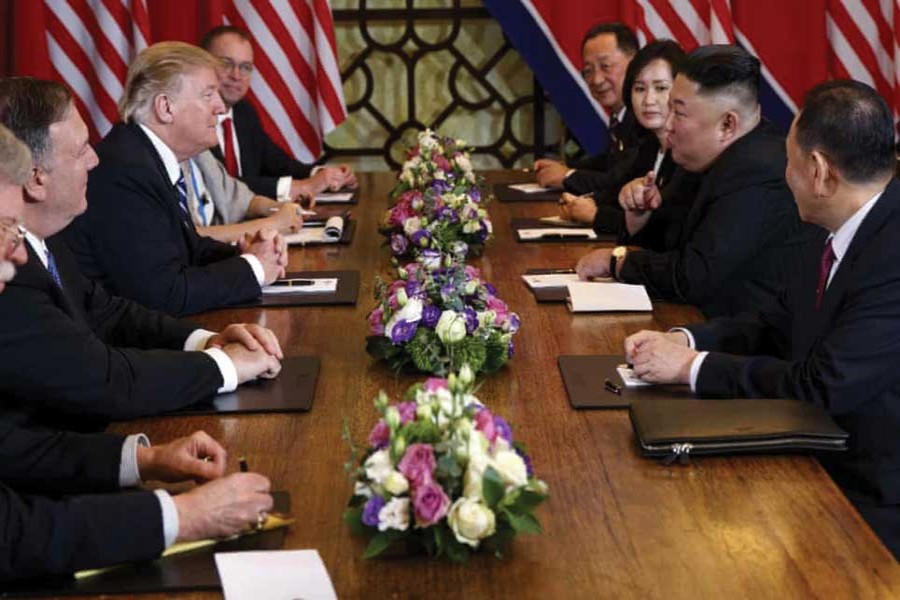American President Donald Trump attended a two-day summit with the North Korean leader Kim Jong Un on February 27 and 28 in Hanoi, Vietnam. Obviously, Trump's diplomacy focused on persuading Kim to eliminate nuclear weapons programme for building a lasting peace regime in the Korean Peninsula. Thus, expectations were quite high. But the summit ended without any deal.
Prior to the summit meeting, President Trump said. "Speed is not important to me. What is important is that we do the right deal." However, the summit concluded abruptly without any agreement. The talks collapsed as North Korea reportedly demanded termination of all economic sanctions.
At a press conference before his departure from Hanoi, Trump revealed that "It was about the sanctions… basically they wanted the sanctions lifted in their entirety, and we couldn't do that."
On the other hand, North Korean Foreign Minister Ri Yong Ho in a midnight press conference refuted President Trump and told the media that Kim made a "realistic proposal," and it was the US that was stubborn in its demands. He elaborated that his country wanted "partial lifting of sanctions" in exchange for complete dismantling of the Yongbyon nuclear complex.
The US Senate majority leader, Republican Mitch McConnell remarked that Trump 'had made the right call' and added that the President should be praised for walking away since sufficient headway had not been made on the denuclearisation issue.
Notably, the first historic meeting of the two leaders took place in last June in Singapore. That was the first step towards reconciliation supposedly for transforming relationships among the two adversaries for decades. The US and North Korea do not have diplomatic relations. President Trump in his State of the Union Address on February 05 described his move as 'bold new diplomacy'. He also claimed the country is no longer a nuclear threat-- a success of his foreign policy.
Notably, in the Singapore summit, Trump and Kim decided to work towards complete denuclearisation of the Korean Peninsula. But since then there had been little progress towards that overriding goal besides limited confidence-building measures. North Korea released US hostages, halted hostile actions, dismantled a nuclear rocket launch location and refrained from ballistic missile tests. On the other hand, the US reduced its joint military drills with South Korea.
During the past year, North Korea demanded the US to take corresponding measures by removing economic sanctions. But Washington called for tangible steps for 'denuclearisation' as well as 'verification' -- two preconditions for lifting US-led sanctions. The sanctions banned main export items of North Korea i.e., coal and iron ore, textiles and seafood as well as import of much needed fuel.
At present, around 28,500 US troops are stationed in the Korean Peninsula ostensibly to reinforce security umbrella for Japan and South Korea against the rapidly rising nuclear-armed China as well as North Korea. North Korea's longer-range missiles appear to threaten US mainland and its short and medium-range missiles are believed to be potentially dangerous threat to Japan and South Korea.
North Korea ratified the Nuclear Non-Proliferation Treaty (NPT) in 1985, but pulled out in 2003, citing US belligerence. Besides by flouting United Nations Security Council resolutions, it has been engaged in nuclear weapons programme.
Analysts believe that complete denuclearisation by North Korea is unlikely unless its security is ensured through US security guarantee that ended the 1950-53 Korean War. Certainly, Kim will not destroy his 'entire' nuclear arsenal. In a report to the Congress, US intelligence agencies also stated that North Korea is "unlikely to completely give up its nuclear weapons."
The collapse of the Hanoi summit has many ramifications. It produced embarrassment for the 'master deal-maker'' Trump who earlier had claimed that only he could deliver. On the other hand, the failure of the summit would probably drive Kim to have closer relations with China and Russia which would deepen their influence in North Korea.
It is also a major setback for South Korean President Moon Jae-in. Since assumption of office in 2017, President Moon has been striving for better relations with North Korea. He cannot advance his plan of inter-Korean partnership held up by sanctions.
To conclude, disagreements over removal of economic sanctions derailed the Hanoi summit. The global community desired a tangible deal on denuclearisation, removal of US-led sanctions as well as formal declaration of a peace treaty. They were disappointed.
Dr. Kamal Uddin Ahmed is a former Professor and Chairman, Department of Political Science, University of Dhaka. [email protected]


